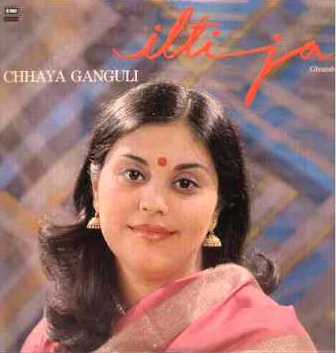Aap ki yaad aati rahi raat bhar, she sang.
Chhaya Ganguli& #39;s debut ghazal in the film Gaman won her a National Film Award for Best Female Playback.
She owed her success to someone whose name she didn& #39;t know. She had forgotten to ask.
Koī dīvāna galiyoñ meñ phirtā rahā...
Chhaya Ganguli& #39;s debut ghazal in the film Gaman won her a National Film Award for Best Female Playback.
She owed her success to someone whose name she didn& #39;t know. She had forgotten to ask.
Koī dīvāna galiyoñ meñ phirtā rahā...
Socho agar aisa hua hota toh kaisa hota... https://medium.com/@manishgaekwad/chhaya-ganguli-a-ghazal-for-the-road-84e02fbd4d84">https://medium.com/@manishga...
Chhaya Ganguli was working as a broadcaster at the All India Radio and Doordarshan when music composer Jaidev met her and asked her to sing a ghazal in the film Gaman.
It was not an offer that could be easily refuted but it made her question his decision.
It was not an offer that could be easily refuted but it made her question his decision.
‘Main kyon?’ (Why me?) she asked politely, erasing the rest of the sentence that was forming in her mind about her selection as a neophyte in a sea of chanteuses in the ghazal form.
‘Kyunki main keh raha hoon’ (Because I said so), he replied.
‘Kyunki main keh raha hoon’ (Because I said so), he replied.
He pulled out a thousand-rupee currency note from his wallet and gave it to her.
‘Advance token,’ he said.
She was even more startled now. She had never been so sure of her singing skill, and the money was too much to flaunt to her middle-class family.
‘Advance token,’ he said.
She was even more startled now. She had never been so sure of her singing skill, and the money was too much to flaunt to her middle-class family.
She hid it in a secret pocket in her blouse, afraid that someone might check her purse at home. She wanted to wait till the recording to inform her family.
A day before the recording, she panicked. On a nippy winter afternoon, she wore a Dhaniakhali cotton cream-coloured sari with a red border. She paired it with a long sleeved blouse with a secret pocket for her token money. She pulled a maroon cardigan over it, and stepped out.
A student of botany, she went to a flower show at the Byculla zoo. Studying plants helped reduce stress she had learnt.
She took along with her the lyrics of the song. Singing to plants was another way for her to draw confidence.
She took along with her the lyrics of the song. Singing to plants was another way for her to draw confidence.
Aap kī yaad aatī rahī raat bhar
Chashm-e-nam muskurātī rahī raat bhar
***
Memories of you haunted me all night
Tear-filled eyes glistened all night
She sang to the intensely fragrant flaming pink kailashpati flower.
Chashm-e-nam muskurātī rahī raat bhar
***
Memories of you haunted me all night
Tear-filled eyes glistened all night
She sang to the intensely fragrant flaming pink kailashpati flower.
She watched the red-skirted mountain rose dance in the breeze along side the yellow radhachura.
She picked fallen leaves from the apta tree considered sacred and called sonpatta and tucked them in her secret breast pocket to still her beating heart.
She picked fallen leaves from the apta tree considered sacred and called sonpatta and tucked them in her secret breast pocket to still her beating heart.
raat bhar dard kī sham.a jaltī rahī
ġham kī lau thartharātī rahī raat bhar
***
All night the lamp of pain kept burning
The flame of pain kept flickering all night
She tried to walk around with the air of a self-reliant beauty described in Tagore’s verse.
ġham kī lau thartharātī rahī raat bhar
***
All night the lamp of pain kept burning
The flame of pain kept flickering all night
She tried to walk around with the air of a self-reliant beauty described in Tagore’s verse.
The red border of her saree fluttered in a rushing draft like the red-beaked palash flower taking flight.
She sat under a Krishna fig tree. The cone shaped leaves of the tree could be made into wallets.
She sat under a Krishna fig tree. The cone shaped leaves of the tree could be made into wallets.
She thought of the thousand-rupee currency note now turning into a gold leaf with the sonpatta in her breast pocket.
She took a sigh of relief, trying to concentrate on the shers of the beautiful ghazal written by the late activist-poet Makhdoom Mohiuddin.
She took a sigh of relief, trying to concentrate on the shers of the beautiful ghazal written by the late activist-poet Makhdoom Mohiuddin.
Her mind wandered how he could be so deeply romantic and a Marxist at the same time. Did the communist not deplore romance and its sentimental indulgence?
bāñsurī kī surīlī suhānī sadā
yaad ban ban ke aatī rahī raat bhar
***
The melodious, enticing sound of the flute
Kept reminding me of you all night
She dozed off. As if Krishna’s mellifluous flute had lulled her to sleep.
yaad ban ban ke aatī rahī raat bhar
***
The melodious, enticing sound of the flute
Kept reminding me of you all night
She dozed off. As if Krishna’s mellifluous flute had lulled her to sleep.
When she woke up, she realised she had walked to the far end of the fifty-acre spread. The sun had set. The purse she was carrying, was missing. She had been robbed in her sleep. The city was notorious for robbing one’s dreams.
Frightened, she stood up and saw that the zoo had been abandoned. She had been forgotten. A glistening moon was shining a beacon of light on her. It helped her trace her footsteps back to the main gate.
yaad ke chāñd dil meñ utarte rahe
chāñdnī jagmagātī rahī raat bhar
***
Memories like recurring moons kept entering my heart
The moonlight gleamed all night
chāñdnī jagmagātī rahī raat bhar
***
Memories like recurring moons kept entering my heart
The moonlight gleamed all night
She told the guard she had overslept. He let her out. It was close to midnight. The street was empty. No soul in sight, she wondered how she would get home. Feeling defeated, she walked a few steps. She heard a taxi’s horn approaching from behind.
The driver stopped the car.
The driver stopped the car.
Aap ko kahan jaana hai madam? (Where do you want to go Madam?), he asked.
& #39;Ghar& #39; (Home), she said.
& #39;Wahan toh sab ko jaana hai, par jaane kab subah ho.& #39; (Everyone wants to go there but who knows when that dawn will arrive), he said.
She told him the address.
& #39;Ghar& #39; (Home), she said.
& #39;Wahan toh sab ko jaana hai, par jaane kab subah ho.& #39; (Everyone wants to go there but who knows when that dawn will arrive), he said.
She told him the address.
& #39;Baith jaiye,& #39; (get in), he said.
As they neared her house, she asked him about his home.
& #39;Itni raat ko aap gaadi chalate hain, aap ko ghar jaane mein der nahi hoti?& #39; (You drive so late into the night, are you not delayed to get home?)
As they neared her house, she asked him about his home.
& #39;Itni raat ko aap gaadi chalate hain, aap ko ghar jaane mein der nahi hoti?& #39; (You drive so late into the night, are you not delayed to get home?)
The driver laughed.
& #39;Madam, hum gaadi chalate hain taaki aap log ghar sahi salamat se pahunch sakein. Iss sheher mein aa kar apna aashiyaana toh ab afsaana lagta hai& #39; (Madam, I drive late so that you can reach home safely. In this city a home for me is like a distant dream)
& #39;Madam, hum gaadi chalate hain taaki aap log ghar sahi salamat se pahunch sakein. Iss sheher mein aa kar apna aashiyaana toh ab afsaana lagta hai& #39; (Madam, I drive late so that you can reach home safely. In this city a home for me is like a distant dream)
She understood from his dialect, language, and philosophy that he was no less a poet than Makhdoom Mohiuddin.
Poetry not only defined their haalaat (condition) but also allayed their pain.
& #39;Aap kahan se ho?& #39; Where are you from, she asked?
& #39;Lucknow,& #39; he said.
Poetry not only defined their haalaat (condition) but also allayed their pain.
& #39;Aap kahan se ho?& #39; Where are you from, she asked?
& #39;Lucknow,& #39; he said.
& #39;Kitne saal se ghar nahi gaye ho aap?& #39; How long has it been since you went home?
& #39;30 years,& #39; he said.
She stopped asking anything as they had reached the house gate.
& #39;Kitna hua?& #39; How much is the fare?
& #39;Teen rupaih, pandrah paise,& #39; he said, reading the meter.
& #39;30 years,& #39; he said.
She stopped asking anything as they had reached the house gate.
& #39;Kitna hua?& #39; How much is the fare?
& #39;Teen rupaih, pandrah paise,& #39; he said, reading the meter.
She stepped out of the car, pulled out the thousand-rupee note from her blouse and gave it to him.
& #39;Arre baap re, he said. & #39;Itna bada note.& #39; (Such a big amount)
His reaction reminded her of her own reaction when she was given the advance token.
& #39;Arre baap re, he said. & #39;Itna bada note.& #39; (Such a big amount)
His reaction reminded her of her own reaction when she was given the advance token.
They weren& #39;t so different from each other after all, she thought. Underestimating the value of their earnestness.
& #39;Madam, aap toh jaanti hi hain abhi-abhi notebandi hui hai. Chhutha nahi hai.& #39;(Madam, you must be aware of the recent demonetisation. I don& #39;t have the change).
& #39;Madam, aap toh jaanti hi hain abhi-abhi notebandi hui hai. Chhutha nahi hai.& #39;(Madam, you must be aware of the recent demonetisation. I don& #39;t have the change).
He was referring to Prime Minister& #39;s Moraji Desai& #39;s demonetisation drive announced a few weeks ago.
She nodded and said, & #39;Aap rakh lo. Ho sakay toh ghar chale jaana.& #39; (Keep it. Go home if possible).
Saying so, she turned and walked away.
She nodded and said, & #39;Aap rakh lo. Ho sakay toh ghar chale jaana.& #39; (Keep it. Go home if possible).
Saying so, she turned and walked away.
The next day in the recording studio Jaidev explained the mood of the song to Chhaya before she could sing.
& #39;Ek aurat apne premi, apne shohar ka besabri se intezaar kar rahi hai. Woh kivaad par khade raah taak rahi hai.& #39; (A woman is waiting for her lover, her husband. She is standing at the door, looking longingly at the deserted road), he said.
koī dīvāna galiyoñ meñ phirtā rahā
koī āvāz aatī rahī raat bhar
***
A lover wandered in the streets
A voice reached my ears all night
She understood perfectly. Her voice would be the light guiding the broken hearted to reach home. https://www.youtube.com/watch?v=GtCLx-W51xM">https://www.youtube.com/watch...
koī āvāz aatī rahī raat bhar
***
A lover wandered in the streets
A voice reached my ears all night
She understood perfectly. Her voice would be the light guiding the broken hearted to reach home. https://www.youtube.com/watch?v=GtCLx-W51xM">https://www.youtube.com/watch...

 Read on Twitter
Read on Twitter




